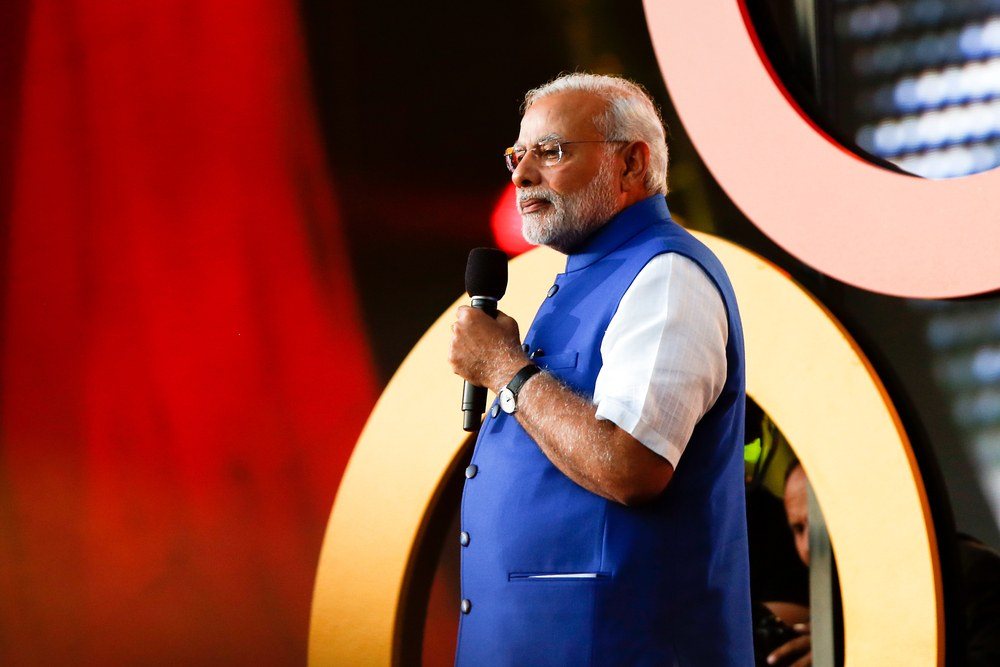How Modi’s Win Raises the Stakes for US-India Relations in Light of China

Prime Minister Narendra Modi's win has implications far beyond India. His policies are likely to impact China and the U.S. as well. | Source: Shutterstock
By CCN.com: Following the conclusion of India’s parliamentary elections, the ruling Bharatiya Janata Party (BJP) headed by Prime Minister Narendra Modi secured a clear victory that many analysts have seen as a ringing endorsement of Modi’s policy direction over the past few years. What passes many Western commentators by, however, is that the result of the world’s largest ever democratic exercise has significant implications outside of India, with Pakistan, China, and the U.S. likely to be impacted by Modi’s intensified policy stance.
The most immediate consequence, of course, is that Pakistan needs to watch its back more closely. Both countries remain technically at war over the disputed region of Kashmir, with deadly skirmishes still flaring up every now and then. CCN.com previously reported that Modi issued what was widely interpreted as a nuclear bombing threat against Pakistan as both countries ratchet up the rhetoric. Beyond saber-rattling with Pakistan and allegedly stirring up Hindu nationalism though, Modi does have a number of lofty regional and intercontinental goals.
China in Modi’s Crosshairs
From a Western viewpoint, it is easy to forget that there’s more than one superpower in continental Asia. While China hits the headlines for developing 5G technology faster than the U.S. and adopting an increasingly militaristic posture within the South China Sea, India – a nuclear-armed state – generally flies under the radar, portraying itself as a benign democracy. Under Modi, this is beginning to change. A desire to stand up to China’s economic and military muscle-flexing within the subcontinent was expressly identified by many as their reason for voting Modi.
In 2018, the country began work on its first ever aircraft carrier , the INS Vikrant, which is scheduled to begin sea trials in 2020. Two more aircraft carriers are planned after the INS Vikrant. Many view this as a direct response to China’s burgeoning naval strength and posturing within the Indian Ocean area. Perhaps very tellingly, unlike its closest neighbor Pakistan – also a nuclear-armed state – India does not purchase much of its military inventory from China, choosing instead to buy hardware from countries like Russia, France, and Israel.
As China continues its inexorable march toward becoming the world’s largest economy, India is clearly preparing for when it will upstage China, as predicted. The multi-pronged effort to prepare India for this new phase of national existence includes everything from defense spending to Modi’s controversial de-monetization policy to a strategic realignment in its diplomatic relationships.
Opportunity for the U.S.?
This presents a clear opportunity for the U.S. to gain a foothold in China’s backyard, depending on how it is handled. It must be mentioned that Modi’s position is neither expressly anti-Chinese nor particularly pro-U.S. He is, in fact, an Indian nationalist in the true sense of the word – preferring to avoid speaking English during public appearances whenever possible and pushing a message about being proudly and unapologetically Indian.
That notwithstanding, he has presided over a quiet expansion of India-U.S. defense and strategic relationships to combat the rise of Chinese influence. Analysts say he is also likely to turn on the defense spending tap when his new term starts, with potentially hundreds of millions of dollars going to American defense contractors. As the U.S.-China trade conflict drags on, the possibility of having a powerful ally that can substitute for China to an extent will no doubt appeal to President Trump’s administration.
The ball is now in Trump’s court to engage creatively with Modi and use the fortuitous situation to apply pressure on China. This newly self-confident India could well turn out to America’s most important ally in the subcontinent.